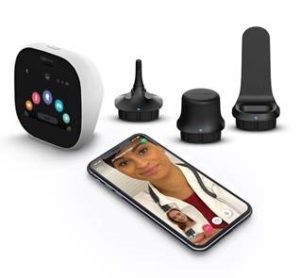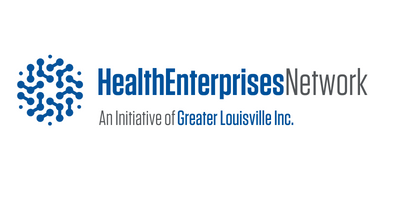 From the chaos of the novel coronavirus, Baptist Health forged a number of innovative ways to safely treat and educate patients that also proved convenient, time-saving and cost-effective.
From the chaos of the novel coronavirus, Baptist Health forged a number of innovative ways to safely treat and educate patients that also proved convenient, time-saving and cost-effective.
Shortly after the pandemic hit the United States in March 2020, Kentucky Gov. Andy Beshear suspended elective procedures at all of the state’s hospitals for 41 days. That, coupled with concerns over the scarcity of protective gear for healthcare personnel, posed a dilemma – how to safely treat patients when their physical access to care was limited by lockdowns and social distancing requirements
The answer — take patient care outside the brick and mortar setting and into the virtual world.
“Our quick pivot to digital solutions allowed Baptist Health to safely provide care and help patients take care of their immediate medical needs, rather than delaying care,” said Baptist Health CEO Gerard Colman. “We’ll continue to use these types of digital solutions – and build on them – in the future.”
For patients, digital health is as convenient as their couch, easing concerns about transportation, braving bad weather and exposure to COVID-19. For healthcare providers, it’s also convenient and maintains vital connections with their patients. On the practical side, supply costs were trimmed and some staff were able to work remotely when offices were closed.
“In just a few months, digital health advanced by years,” said Nick Sarantis, system director of digital health. “People have embraced the shift to digital health. It’s one of the silver linings of the pandemic.”
Rapid transition
Once medical offices closed because of the pandemic, Baptist Health moved swiftly to beef up its virtual care capabilities. In just a weekend, IT teams dramatically ramped up digital health capabilities so healthcare providers could connect with their patients via video visit.
“We went from using a single provider to deliver virtual urgent care treatment, to all of our medical group’s specialties utilizing virtual services with patients to some extent,” said Brett Oliver, MD, chief medical information officer. “These capabilities were later expanded to allow new patients to use the service.
“Without digital health, there simply would not have been access for patients and providers to connect,” he added. “Many routine visits would have been put off for a long time. Patients and providers both were able to remain safe in their homes, during very unknown times.”
In 2020, 217,838 digital encounters were made between Baptist Health providers and patients, including 102,625 scheduled video visits and 101,427 telephone visits.
Digital health innovation continues at Baptist Health, adding technology such as the TytoCare™ medical kit device to allow the provider to “see” into your mouth or ears – plus, it acts as a stethoscope. Baptist Health has offered these to its employees in a pilot project.
Technology such as Tyto allows providers to treat patients with health concerns that now require an in-office evaluation. For example, the provider may treat a patient for an ear infection via a video visit when the patient has this technology that transmits an image so the provider can see inside the patient’s ear.
Keeping track of patients
One solution to the crowded waiting room issue was using the MyChart Hello Patient feature. When medical offices reopened, Hello Patient helped with social distancing by using geolocation to detect when a patient arrives for his or her appointment. The office, alerted that the patient has arrived, sends a message to wait in the car for further instructions or enter the building and check in with registration staff.
Before COVID-19 made virtual care the norm, Baptist Health was at the forefront in remote monitoring of higher-risk home care patients to prevent hospital readmissions. With the pandemic, Baptist Health changed course, using the wearable devices to keep tabs on COVID-19 patients who could be cared for at home. The move freed up valuable bed space at the hospital, reduced the healthcare team’s exposure to the virus, and increased patient safety.
Between March and November 2020, Baptist Health enrolled 270 COVID-19 patients to the home monitoring program after early discharge from the hospital. None were readmitted, according to a case study conducted by the device vendor, Current Health.
Supporting patients
Baptist Health has traditionally offered a wide range of in-person patient education classes, for conditions ranging from pregnancy to preparation for surgery to controlling diabetes. Virtual classes had long been considered, but those ideas were swiftly translated into action when traditional classes were abruptly canceled.
Digital health proved popular — a virtual connection between patients and caregivers for emotional support, consultation and education in a number of ways:
- A bi-weekly support group for weight-loss surgery patients at Baptist Health Lexington.
- Pre-surgery classes for total joint replacement surgery. Attendance at Baptist Healthy Louisville’s virtual classes hit 94.4 percent – up nearly 16 percent from in-person education.
- Cancer education classes and support for young people with cancer and those with breast cancer. Related courses on stopping smoking, and crafting advance directives, were also launched at Baptist Health Louisville. Baptist Health Lexington used similar methods to connect with patients, and their genetic counselors can now provide services to any other Baptist Health facility.
- Expectant parents’ classes.
- Diabetes education classes helped patients stay on track with their nutrition and weight-loss goals, with participants at Baptist Health Louisville losing 500 pounds in a quarter.
- Baptist Health Corbin moved its “Noontime Knowledge” health and wellness sessions for the public to a teleconferencing format so the program could continue.

Recent Comments